Résumé
El presente artículo desarrolla una historia comparativa de las trayectorias de las sedes del Congreso por la Libertad de la Cultura en México e India durante la década de 1950. El planteamiento central de este escrito es que las actividades promovidas desde ambas sedes desempeñaron un papel central en el establecimiento de una cultura liberal de elite articulada en torno a la denuncia del peligro que el totalitarismo de izquierda representaba para el futuro de ambos países y, por extensión, para el resto del Tercer Mundo. En una época en la que la batalla por las ideas definía no sólo las coordenadas geopolíticas globales, sino también la orientación subjetiva y las aspiraciones de los intelectuales cosmopolitas del Tercer Mundo, esta cultura de elite fue central para la consolidación de un nuevo consenso intelectual definido por el anticomunismo y la defensa del liberalismo como único horizonte político.
Références
Alburquerque, G. (2011). La trinchera letrada. Intelectuales latinoamericanos y guerra fría. Santiago: Ariadna Ediciones.
Amat, J. (2016). La semilla del liberalismo. Política y literatura en torno a la actividad española del Congreso por la Libertad de la Cultura (1958-1969). (Tesis de doctorado inédita). Universidad de Barcelona, España.
Anderson, K. B. (2010). Marx at the margins: On nationalism, ethnicity, and non-western societies. Chicago: The University of Chicago Press.
Anderson, A. (2011). Character and ideology: The case of cold war liberalism. New Literary History, 42(2), 209-229. DOI: https://doi.org/10.1353/nlh.2011.0017
Bell, D. (1960). The end of ideology: On the exhaustion of political ideas in the fifties. Nueva York: Free Press.
Berlin, I. (1990). The crooked timber of humanity. Princeton, New Jersey: Princeton University Press.
Burke, R. (2016). “Real problems to discuss”: The Congress for Cultural Freedom’s Asian and African expeditions, 1951-1959. Journal of World History, 27(1), 53-85. DOI: https://doi.org/10.1353/jwh.2016.006
Chakrabarty, D. (2005). Legacies of bandung: Decolonisation and the politics of culture. Economic and Political Weekly, 40(46), 4812-4818. Recuperado de http://www.jstor.org/stable/4417389
Chaudhuri, R. (2013). Forged in crisis: India and the United States since 1947. Londres: C. Hurst & Co.
Dube, S. C. (1958). India’s changing villages: Human factors in community development. Londres: Routledge and Kegan Paul Ltd.
Cohn, D. (2005). The Mexican intelligentsia, 1950-1968: Cosmopolitanism, national identity, and the State. Mexican Studies/Estudios Mexicanos, 21(1), 141-182. DOI: https://doi.org/10.1525/msem.2005.21.1.141
Coleman, P. (1989). The liberal conspiracy. The Congress for Cultural Freedom and the struggle for the mind of postwar Europe. Nueva York: Free Press.
Franco, J. (2002). The decline and fall of the lettered city. Latin America in the cold war. Cambridge, Mass.: Harvard University Press.
Gilman, N. (2003). Mandarins of the future. Modernization theory in cold war America. Baltimore: Johns Hopkins University Press.
Hegel, F. W. G. (1956). Philosophy of history. Nueva York: Dover.
Holt, E. M. (2013). “Bread or freedom”: The Congress for Cultural Freedom, the CIA, and the Arabic Literary Journal Ḥiwār (1962-67). Journal of Arabic Literature, 44(1), 83-102. DOI: https://doi.org/10.1163/1570064x-12341257
Iber, P. (2015). Neither peace nor freedom: The cultural cold war in Latin America. Cambridge, Mass.: Harvard University Press.
Indian Congress for Cultural Freedom (1951). Indian Congress for Cultural Freedom. March 28 to 31, 1951. Bombay: Kanada Press.
Glondys, O. (2018). Dismissals of the Congress for Cultural Freedom’s representatives in Latin America as part of the strategy of “Opening to the left” (1961-1964). Culture and History Digital Journal, 7(1), 87-98. DOI: https://doi.org/10.3989/chdj.2018.010
Jannello, K. (2012). El Congreso por la Libertad de la Cultura: el caso chileno y la disputa por las “ideas de fuerza” de la guerra fría. Revista Izquierdas, 14, 14-52. Recuperado de http://www.izquierdas.cl/ediciones/2012/numero-14-diciembre
Jannello, K. (2014). Redes intelectuales y guerra fría: la agenda argentina del Congreso por la Libertad de la Cultura. Revista de la Red Intercátedras de Historia de América Latina Contemporánea, 1, 60-85. Recuperado de https://revistas.unc.edu.ar/index.php/RIHALC/article/view/8365
Keller, R. (2015). Mexico´s cold war. Cuba, the United States, and the legacy of the Mexican revolution. Nueva York: Cambridge University Press.
Kent Carrasco, D. (2016). Jayaprakash Narayan and Lok Niti: socialism, gandhism and political cultures of protest in XX century India. (Tesis de doctorado indédita). King’s College, Londres, Reino Unido.
Kent Carrasco, D. (2020). El socialismo Gandhiano. Crítica a la modernidad y utopía poscolonial. En C. Illades, R. Mondragón y F. Quijano (eds.), En ningún lugar y en todas partes. Utopía y socialismo, un horizonte compartido (pp. 283-306). México: Universidad Nacional Autónoma de México.
Latham, R. (1997). The liberal moment. Modernity, security, and the making of the postwar international order. Nueva York: Columbia University Press.
Latham, M. E. (2003). Modernization as ideology. American social science and “Nation Building” in the Kennedy era. Chapel Hill: The University of North Carolina Press.
Lewis, S. L. (2019). Asian socialism and the forgotten architects of post-colonial freedom, 1952-1956. The Journal of World History, 30(1-2), 55-88. DOI: https://doi.org/10.1353/jwh.2019.0013
Loaeza, S. (2006). La fractura mexicana y el golpe de 1954 en Guatemala. Historia Mexicana, 66(2), 725-791. DOI: http://dx.doi.org/10.24201/hm.v66i2.3346
Masani, M. R. (1955). The mind of Asia. Foreign Affairs. Recuperado de https://www.foreignaffairs.com/articles/east-asia/1955-07-01/mind-asia
McGarr, P. M. (2013). The cold war in South Asia: Britain, the United States and the Indian subcontinent, 1945-1965. Cambridge: Cambridge University Press.
Medina, L. (1979). Historia de la Revolución Mexicana, 1940-1952: civilismo y modernización del autoritarismo. Distrito Federal: El Colegio de México.
Metcalfe, T. R. (1997). Ideologies of the raj. Nueva York: Cambridge University Press.
Moreno, J. (2004). Yankee don’t go home!: Mexican nationalism, American business culture, and the shaping of modern Mexico, 1920-1950. Chapel Hill, N. C.: University of North Carolina Press.
Nanda, B. R (1998). Nehru and non-alignment. Delhi: Oxford University Press.
Nayudu, S. K. (2015). The Nehru years: Indian non-alignment as the critique, discourse and practice of security (1947-1964). (Tesis de doctorado inédita). King’s College, Londres, Reino Unido.
Nehru, J. (2002). Speech inaugurating the new building of the Punjab High Court, Chandigarh, March 19, 1955. En Selected works of Jawaharlal Nehru (vol. 28, 1 February-31 May 1955). Nueva Delhi: Oxford University Press.
Prasad, B. (ed.) (2005). Jayaprakash Narayan. Selected works (vol. VII, 1954-1960). Delhi: Manohar.
Pullin, E. D. (2011). “Money does not make any difference to the opinions that we hold”: India, the CIA, and Congress for Cultural Freedom. Intelligence and National Security, 26(2-3), 377-98. DOI: https://doi.org/10.1080/02684527.2011.559325
Reid, E. (1981). Envoy to Nehru. Nueva York: Oxford University Press.
Rivera Mir, S. (2018). La difusión del marxismo en tiempos convulsos. Rodrigo García Treviño y Editorial América (1936-1940). En A. Granados y S. Rivera Mir (eds.), Prácticas editoriales y cultura impresa entre los intelectuales latinoamericanos del siglo XX (pp. 71-98). Zinacantepec-Ciudad de México: El Colegio Mexiquense/Universidad Autónoma Metropolitana.
Roosevelt, E. (1954). India and the awakening east. Londres: Hutchinson.
Rubin, A. N. (2012). Archives of authority. Empire, culture and the cold war. Princeton, N. J.: Princeton University Press.
Santos, E. (1956). Presentación. Cuadernos, 19.
Saunders, F. S. (2001). La CIA y la guerra fría cultural. Barcelona: Debate.
Schlesinger jr., A. M. (2017). The vital center. The politics of freedom. Londres y Nueva York: Rutledge.
Shils, E. (1958). Ideology and civility: on the politics of the intellectual. The Sewanee Review, 66(3), 450-480.
Shils, E. (septiembre, 1990). Remembering the Congress for Cultural Freedom. Encounter, 52-65.
Scott-Smith, G. (2000). “A radical democratic political offensive”: Melvin J. Lasky, Der Monat, and the Congress for Cultural Freedom. Journal of Contemporary History, 35(2), 263-280. DOI: https://doi.org/10.1177/002200940003500207
Scott-Smith, G. (2001). The politics of apolitical culture. The Congress for Cultural Freedom and the political economy of American hegemony 1945-1955. Londres: Routledge.
Scott-Smith, G. (2002). The Congress for Cultural Freedom, the end of ideology, and the 1955 Milan conference: “Defining the parameters of discourse”. Journal of Contemporary History, 37(3), 437-455. DOI: https://doi.org/10.1177/00220094020370030601
Trilling, L. (2008). The liberal imagination (e-book). Nueva York: New York Review of Books.
Paz, O. (1993). El laberinto de la soledad. Madrid: Cátedra.
Ruiz Galbete, M. (2018). ¿“Fidelismo sin Fidel”? El Congreso por la Libertad de la Cultura y la Revolución Cubana. Historia Crítica, 67, 111-132. DOI: https://doi.org/10.7440/histcrit67.2018.06
Sen, T. (2017). India, China, and the world. A connected history. Nueva Delhi: Oxford University Press.
Westad, O. A. (2005). The global cold war. Third world interventions and the making of our times. Nueva York: Cambridge University Press.
Aquellos autores/as que tengan publicaciones con esta revista, aceptan los términos siguientes:
- Los autores/as conservarán sus derechos de autor y garantizarán a la revista el derecho de primera publicación de su obra, el cuál estará simultáneamente sujeto a la Licencia de reconocimiento de Creative Commons Atribución-NoComercial 4.0 Internacional que permite a terceros compartir la obra siempre que se indique su autor y su primera publicación esta revista.
- Los autores/as podrán adoptar otros acuerdos de licencia no exclusiva de distribución de la versión de la obra publicada (p. ej.: depositarla en un archivo telemático institucional o publicarla en un volumen monográfico) siempre que se indique la publicación inicial en esta revista.
- Se permite y recomienda a los autores/as difundir su obra a través de Internet (p. ej.: en archivos telemáticos institucionales o en su página web) antes y durante el proceso de envío, lo cual puede producir intercambios interesantes y aumentar las citas de la obra publicada. (Véase El efecto del acceso abierto).




